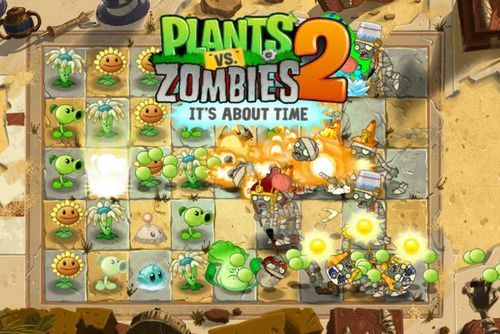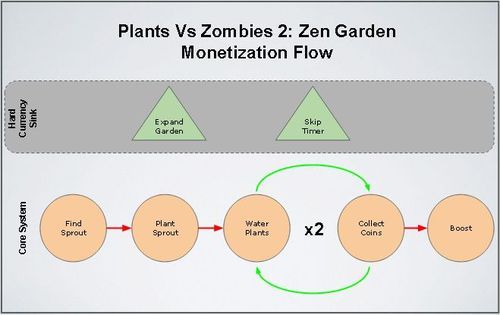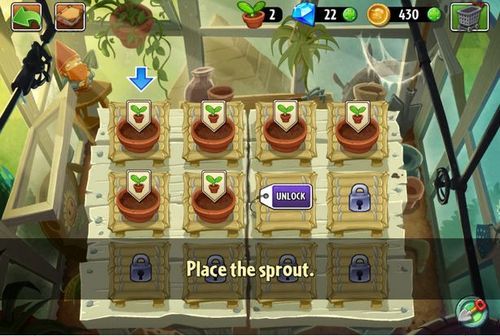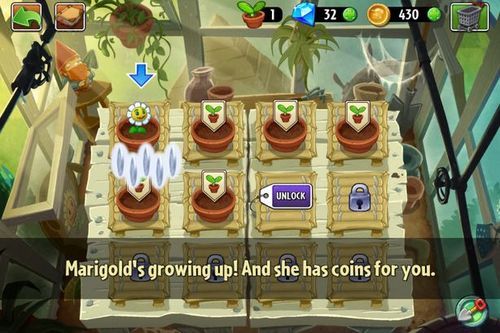
Featured Blog | This community-written post highlights the best of what the game industry has to offer. Read more like it on the Game Developer Blogs or learn how to Submit Your Own Blog Post
How Introducing a Second Currency Improved PvZ2
An analysis of the economy in Plants Vs Zombies 2 before and after their most recent update.


A few weeks back, PopCap introduced their newest feature to Plants Vs Zombies 2 (PvZ2) - The Zen Garden. The Zen Garden is a place where players can tend their sprouts until they grow into boosts for the player to bring into their game. This relatively simple feature is a clever way to adjust a few levers within PvZ2 that improve the overall quality of play while offering more satisfying purchasing opportunities.
Pre-update Economy Overview
Before this update, players were quite limited in the ways they could purchase. Outside of explicitly buying new plants for a one-time cost - the main monetization sink was purchasing soft currency. Soft Currency, a currency that is generally simple to acquire during play, is a common method of monetization within free-to-play games, but within PvZ2 was riddled with friction.
In PvZ2, the soft currency (coins) sink is within a given level - an environment that, in general, is quite complex and very time sensitive. This forces players to consistently make rapid cost/benefit analyses that gauge the worth of using a costly abilities that fend off waves of zombies. While this is still the case in the current patch, the previous fault of the game was that coins were also the primary currency.
As the primary currency, players are far less interested in spending because at any point it may be necessary to pass a level. This fear is coupled with the fact that players can't be guaranteed that the appropriate source for it will be readily available after their purchase. And this is rightly so - as developers are far less likely to increase the number of sources for this currency since a squeeze is conventionally thought to create monetization points.
Zen Garden Update
With the most recent update, I would argue that coins are no longer the primary currency. Instead, a new hard currency (diamonds) is introduced that's more flexible than coins and offers purchases outside of levels. Note: Hard Currency is a currency that is generally difficult, if not impossible, to acquire without purchasing.
This shift in primary currencies allows developers to ease up on the coin economy and introduce a major source for earning them. Hypothetically, an influx in coins alleviates a lot of stress during the cost/benefit analyses within the level - encouraging players to more freely engage with the in-game boosts. Once these boosts become part of playing a normal level (not just to be used in emergencies), players may become more invested in actually purchasing coins without necessarily feeling heavily pressured into doing so. Note: The current top in-app purchases are the coin packs.
Let's now shift our focus on the newest feature to join PvZ2 - the Zen Garden. Below is a simple abstract flow that divides out the core system (bottom half) and hard currency sinks (top half).

Before players can even begin engaging with the newest feature, they must acquire a sprout - an item that can be dropped upon destroying a zombie.
One of the more interesting decisions about sprout logic, is that it isn't known to the player exactly what plant it will grow into. This removes potential decision making that may have been a burden on the player (Player win!), but at the risk of essentially creating a slot machine mechanic. While this could be a problem if implemented poorly, players generally come away with a rather helpful boost which shouldn't warrant frustration (Dev win!).
With the sprout, players may access the Garden and find an open space to plant it. Note: Players begin with a decent number of pots so space shouldn't be an issue until you've really started to engage with the system.

It's at this point where the player can see exactly what they're investing in. And if the boost isn't worth the player's time to fully tend - they can simply use the shovel and clear up space for a potentially more beneficial boost.
With the sprout planted, players then water it and transition into a two-part waiting game. The first timer is relatively short, 15 minutes or so, and upon finishing relinquishes a few hundred coins to the player. The player is then asked to partake again in another round which then takes a few hours to complete. This longer timer is rewarded nicely - within approximately ten times the amount of coins and a boosted plant to bring into a level.

After moving through this core system a few times, the benefits begin to very much reveal themselves. This is critical to the success of the game. Seeing the payoff for engaging with the feature, players will begin to value it more and potentially see reason enough to expedite the purchase (or spend diamonds on purchasing the boosts directly!).
Looking Forward
Previously, I had a hard time getting into PvZ2. Like many free-to-play games, the implementation of monetizing players through payments loaded with friction was heavily off-putting. But after spending only a few days trying the most recent update, I'm starting to see how this game was intended to be played. With this major shift in the economy, there's loads of complexity and wackiness the player can now more easily engage in without feeling like they'll be punished for doing so. Overall, I'm really excited about the newest build and to see how these economic changes impact the game's overall health.
Thanks for reading!
G
Read more about:
Featured BlogsAbout the Author(s)
You May Also Like







.jpeg?width=700&auto=webp&quality=80&disable=upscale)








